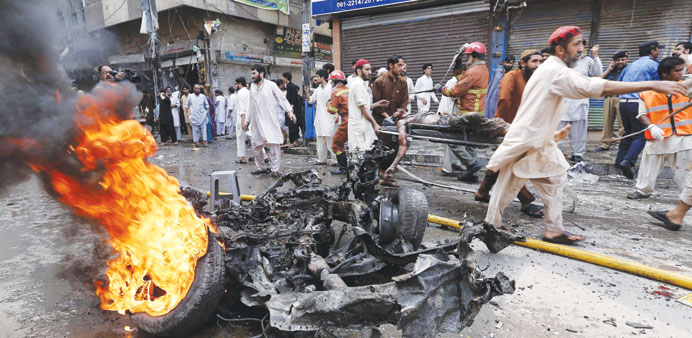AFP/Islamabad
A car bomb killed at least 39 people yesterday in Pakistan’s northwestern city of Peshawar, officials said, the third deadly strike to hit the city in a week.
The bomb caused carnage in the busy Kissa Khwani market in the city, the gateway to tribal regions which are a stronghold of militants linked to the Taliban and Al Qaeda.
“The blast killed at least 39 people,” top local administration official Sahebzada Mohamed Anis said.
A senior official at Peshawar’s Lady Reading Hospital, Dr Arshad Javaid, confirmed the new death toll and said 91 people were still in hospital after several of the injured were treated and sent home.
The dead included eight women and six children aged five to nine.
The bomb went off near a police station but officials said it did not appear to have been the target.
“It looks like the market was the target,” said bomb disposal chief Shafqat Malik.
He told AFP a car parked by the roadside had apparently been converted into a remote-controlled bomb.
Prime Minister Nawaz Sharif, who is in New York for the UN General Assembly, strongly condemned the blast.
“Those involved in the killing of innocent people are devoid of humanity and all religions,” he said in comments released by his office.
The blast caused major destruction, toppling a two-storey building and gutting several shops, an AFP reporter at the scene saw.
Thick grey clouds engulfed the entire area after several shops caught fire. At least 50 shops were either damaged or completely destroyed.
Human limbs, blood, broken glass, stationery, blood-soaked clothes and sandals littered the road.
Rescuers pulled several bodies from a passenger minivan which was passing the explosives-laden vehicle when it exploded.
Officials said the 13 minivan passengers were members of the same family.
“They had come to Peshawar from Shabqadar town for shopping ahead of my daughter’s wedding,” a family elder Sartaj Khan said.
Officials and rescue workers were collecting body parts and bodies and putting them in ambulances for over an hour after the blast.
“I was standing in front of a shop to buy ice cream for my ailing nephew who was with me when a deafening explosion rocked the entire area,” Mohamed Sajjad, 26, who works in Saudi Arabia as a labourer, said in the hospital.
“The explosion was so intense that it threw me and my nephew a few metres, injuring both of us,” said Khan, who escaped with a minor head injury.
Weeping relatives of the dead and injured gathered at the hospital as rescuers brought in bodies or small bundles of human remains.
Mohamed Wajih, 40, said he was repairing a customer’s watch at his shop when there was a huge blast.
“Half of the face of my customer, who was standing just in front of my shop, blew up while several stray splinters hit his back,” said Wajih, who was himself unhurt.
On Sunday last week a twin suicide attack at a Peshawar church killed 82 people, triggering nationwide protests by the Christian community and others demanding better protection for minorities.
On Friday a bomb tore through a bus carrying government employees on the edge of Peshawar, killing 18 people.
Peshawar is the gateway of the semi-autonomous tribal belt that US officials consider a safe haven for Al Qaeda and other insurgents fighting both in Pakistan and across the border in Afghanistan.
The umbrella Tehreek-e-Taliban Pakistan faction has led a bloody campaign against the Pakistani state in recent years, carrying out hundreds of attacks on security forces and government targets.
Two weeks ago Pakistan’s main political parties backed the prospect of peace talks with the militants, an idea floated several times by Prime Minister Nawaz Sharif.
But a series of attacks since then, including the killing of a senior army commander, have led many to question the strategy.
Pakistan is on the frontlines of the US-led war on Al Qaeda. Since July 2007 it has also been gripped by a local Taliban-led insurgency, concentrated largely in the northwest.

People shift a body of a victim from the scene of a bomb blast in Peshawar yesterday.
